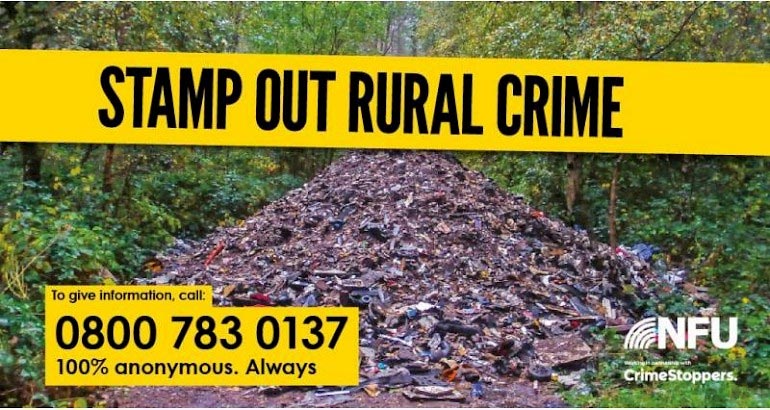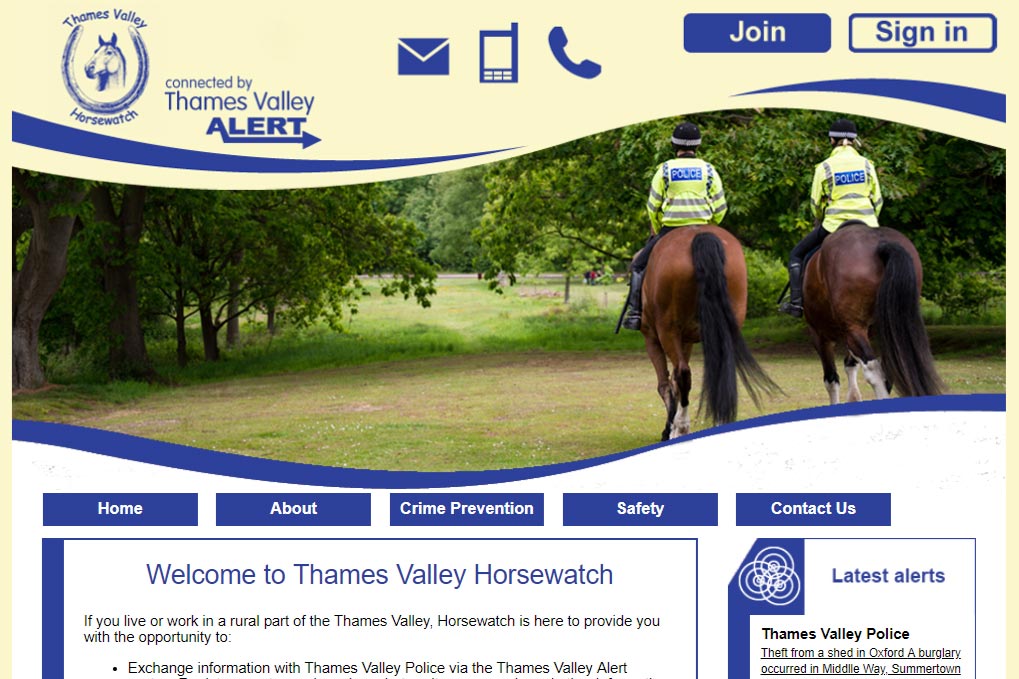Rural Crime is one of the 22 priorities on which residents are asked to vote every quarter.
Realistically, it would be surprising if it were to figure at the top of a quarterly survey. As Thames Valley Police says in its What is Rural Crime? web page: “Rural crime is an issue for large areas of the country, but it tends to go unreported. It can impact on insurance premiums, food prices and damage local communities. It can be hard to know whether something is a crime and whether to contact the police or another charity or organisation.”
The recent setting up of a Rural Crime taskforce in Thames Valley is a very positive step forward. This establishes a team of dedicated officers, with intelligence support, to tackle serious and organised rural crime.
Thames Valley Police launches Rural Crime Taskforce
The taskforce maintains an active Twitter presence with a great deal of advice on issues pertaining to rural crime, as well as updates on incidents and operations.
The main purpose of this page is to signpost where residents can go for advice on Rural Crime prevention, to report Rural Crime and get support where needed. Also how to get involved with initiatives such as the Chiltern Rural Crime WhatsApp Group, Thames Valley Horse Watch and Rural Spotters.
What is Rural Crime?
NFU Mutual’s report on Rural Crime in 2021 put the value of rural crime in 2020 nationally at £43.3m, a reduction from £54m in 2019. This is based on claims statistics.
It comments that lockdown movement restrictions, police rural crime teams, and beefed-up farm security helped to curb crime over the pandemic. However, the trend of skilled and organised criminals targetting farms continues, targetting high value items such as tractor GPS systems, quad bikes and ATVs and agricultural vehicles, as well as livestock.
Rural Crime includes the following main categories:
- Agricultural: covering working farms, farm machinery, farm buildings and smallholdings; offences include theft of equipment or fuel, damage to property and livestock worrying.
- Livestock theft: 2019 report by NFU Mutual noted that this is on the increase, including the distressing practice of butchering animals in fields.
- Equine: covering working stables and equestrian centres, and includes offences like tack theft and livestock worrying.
- Wildlife: includes hare coursing, poaching and interfering with protected species. Visit Thames Valley Police Wildlife Crime page.
- Heritage crime, defined as ‘any offence which harms the value of England’s heritage assets and their settings to this and future generations’. That can include offences like lead theft from churches, damage to ancient monuments and illegal metal detecting.
- Environmental crime, covering illegal waste dumping, fly tipping, polluting watercourses and land. Many waste or environmental issues need to be reported to your local council or other agencies, though large scale dumping should be reported on 101, and hazardous waste presenting an immediate danger to the public, should be reported immediately by calling 999. Visit Thames Valley Police Environmental Crime page.
The Importance of Reporting Rural Crime
Rural Crime Reporting Line

By ringing 0800 783 0137 or visiting www.ruralcrimereportingline.uk, farmers, rural businesses and the public can anonymously give information about crime relating to:
- large-scale, industrial fly-tipping
- hare coursing
- machinery theft
- livestock theft
Thames Valley Police’s advice for reporting crime is “If you think an offence has or is about to be committed, let us know. You can report it to us online or by calling 101. If you’re not sure it’s a crime, we’d rather hear from you and determine that ourselves.”
By reporting crime, you can help the Police build up a larger picture, allowing patterns of criminality to be identified, and resources to be targetted.
In instances where there is an immediate danger to the public, report immediately using 999.
Another alternative is the Rural Crime Reporting Line, run by the National Farmers Union in conjunction with Crimestoppers and supported by the Police. This national, anonymous reporting system allows offences and activity to be directed to the correct agency. Reporting can be done by calling 0800 783 0137 or by completing an online form 100% anonymously.
Fly Tipping is handled by Bucks County Council, with support from the Police where follow-up prosecutions are possible. Please report instances of fly tipping to the Bucks CC Fly Tipping Reporting Service.
Getting Involved – Rural Networks
Chiltern Community Forum encourages residents to involve themselves, where possible and safe, to help ensure safe, resilient communities. Becoming an active member of rural networks can make a real difference.
Chiltern Rural Crime WhatsApp Group
This group is run by the public, with Nicole Johnson, the administrator, responsible for admitting new members. If you would like to sign up please e-mail Nicole at: clerk@pennparish.org.uk
A code of conduct will need to be agreed to before members can use the platform. The purpose of the group is not a crime reporting tool, but to share information about suspicious incidents to make both the community and Police aware.
Direct engagement with the Neighbourhood Team will assist the Police in where to target patrols and in which areas to raise their visibility. It is important to report all crimes. Information helps in targetting resources and developing intelligence.
Thames Valley Horse Watch
Thames Valley Horse Watch

Thames Valley Horse Watch connects horse owners and riders to improve security and communication. Members do not have to own a horse, the scheme welcomes everyone, whether they are an occasional rider, own a yard or just want to assist the community.
Members receive information on security, tack marking, shows, events as well as messages through the Alert system about recent crimes, details of stolen property or suspicious persons and vehicles. Horse Watch is run solely for the benefit of its members.
Rural Spotters
Rural Spotters is a scheme launched in June 2019, through which volunteers – all horse riders – engage with the rural community whilst out on their normal hacking route and assist in rural and equine crime prevention. The volunteers will report any suspicious activity, including fly tipping, unauthorised off road biking and hare coursing to the Rural Crime Reporting Line. For more information, visit our news post on Rural Spotters.
The Rural Spotters scheme builds on the work of the Thames Valley Horse Watch network which brings local horse owners, riders and equestrian workers together with their local police team.
Further Useful Links
Thames Valley Police: Rural Crime Prevention – includes advice on Equipment and tool security, Estate and building security, Boundaries, Fire prevention, Illegal occupation, Diesel theft, Livestock theft, Tack security, Chemical storage.
National Rural Crime Network: championing a better understanding of crime in rural areas, and new, effective ways to help to keep rural communities safe.
National Rural Crime Survey 2018
Thames Valley Police: What you can do about wildlife crime
UK National Wildlife Crime Unit
The CESAR scheme: set up to provide an official equipment security and registration scheme. It seeks to deter theft and aid recovery, using Datatag ID technologies, and registration of equipment on a secure database. See also our news item CESAR discounts to help protect from Rural Crime (October 2020)








